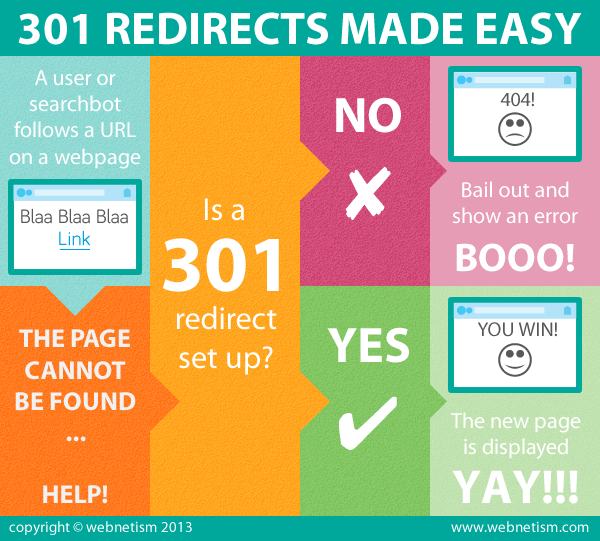Increase Organic Web Traffic by Using the Potential of 301 Redirects for Search Engine Optimization
When it comes to enhancing a web site for search engines, the critical usage of 301 redirects can dramatically influence natural website traffic development. By recognizing the details of 301 redirects and applying them properly, organizations can open the complete capacity of their Search engine optimization approaches.
Recognizing 301 Reroutes Fundamentals
When getting started on the journey to understand 301 redirects, it is necessary to understand the fundamental concepts that underlie this essential facet of web site optimization. A 301 redirect is a permanent redirect from one Link to another.
Furthermore, utilizing 301 reroutes appropriately can prevent individuals from coming across 404 mistakes, enhancing the general use of the web site. Understanding the basics of 301 redirects is foundational for any type of Search engine optimization method intending to boost website visibility and usability while preserving search engine rankings.
Carrying Out Redirect Methods
To effectively enhance website efficiency and customer experience, critical application of redirect methods is vital in enhancing online presence. 301 Redirect. When applying redirect approaches, it is vital to have a clear strategy in location to ensure a smooth change for both internet search engine and individuals. Begin by recognizing the web pages that need to be rerouted and one of the most suitable redirect type to make use of, such as 301 redirects for long-term relocations or 302 redirects for temporary adjustments
Frequently reviewing and upgrading redirect methods as required is important to preserve a healthy and balanced website and take full advantage of natural website traffic. By implementing redirect techniques successfully, internet sites can improve their SEO performance and offer a much better individual experience.
Staying Clear Of Usual Redirect Mistakes
One critical aspect in maintaining a seamless site shift during redirect application is avoiding typical redirect errors. One typical error to avoid is executing several chains of redirects. These chains can reduce the user experience and perplex search engine crawlers, resulting in reduced organic traffic. Another blunder is not upgrading interior links to show the new redirect paths. When inner web links indicate old URLs, it can result in a poor customer experience and adversely effect SEO initiatives. Additionally, failing to establish up correct redirects for both the www and non-www variations of a web site can split web link equity and create indexing problems. It is essential to guarantee that all variations of the link redirect to a solitary liked version to consolidate ranking signals. By avoiding these typical redirect blunders and performing complete testing post-implementation, website proprietors can efficiently enhance their search engine optimization techniques and drive organic web traffic growth.
Monitoring Redirect Efficiency
Tracking why not check here the performance of 301 redirects is important in figuring out if they are effectively directing traffic to the desired location. Keeping track of the organic website traffic, bounce prices, and time spent on the rerouted pages can help analyze whether the redirects are fulfilling their designated goals. By continually keeping an eye on redirect performance, internet site owners can make data-driven decisions to maximize their SEO approaches and improve the overall customer experience, eventually leading to boosted natural traffic and search click this link engine positions.

Leveraging Redirects for SEO Development
Redirects play a critical duty in improving the seo (SEO) development of a site by purposefully directing customer traffic in the direction of relevant material. Leveraging redirects effectively can substantially impact a web site's visibility and ranking on internet search engine results pages (SERPs) When carrying out redirects for search engine optimization growth, it is necessary to focus on maintaining link equity by redirecting old Links to brand-new, pertinent web pages. By doing so, search engines are more probable to attribute the authority and relevance of the old page to the brand-new location, positively impacting the general search engine optimization efficiency. Additionally, utilizing 301 redirects can assist settle web link signals and prevent content duplication problems, which can thin down search engine optimization efforts. Furthermore, leveraging redirects for SEO growth includes surveillance and upgrading them regularly to ensure they remain to serve their designated function successfully. Frequently reviewing the efficiency of redirects and making essential adjustments based upon analytics and SEO best practices is essential to driving sustained organic traffic growth.
Conclusion
To conclude, Resources carrying out 301 redirects can considerably benefit natural web traffic growth by successfully guiding users to pertinent material. Understanding the essentials, carrying out redirect strategies, staying clear of typical mistakes, and checking performance are crucial actions in leveraging redirects for SEO development. By utilizing 301 reroutes efficiently, web sites can improve their internet search engine rankings and supply a better customer experience, ultimately bring about enhanced natural traffic.

Checking the organic web traffic, bounce prices, and time spent on the redirected pages can aid assess whether the redirects are satisfying their desired objectives. When implementing redirects for SEO development, it is essential to focus on preserving link equity by redirecting old Links to brand-new, relevant pages. Comprehending the essentials, implementing redirect techniques, preventing typical blunders, and monitoring performance are important actions in leveraging redirects for Search engine optimization development.
Comments on “Optimize and Redirect: Unveiling the Impact of 301 Redirect on SEO Strategies”